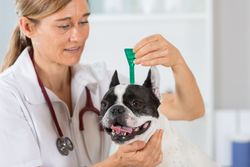Why You Should Make Flea & Tick Prevention a Priority This Summer

Summertime is a peak season for flea and tick activity throughout the United States. When the weather warms up, these parasites start breeding and their populations explode. To feed, these blood-sucking pests will attack animals — especially dogs and cats who go outdoors. As a result of feeding, fleas and ticks can cause a variety of pet care problems. To help your four-legged friend stay safe this season, here are a few important points to know about flea and tick prevention.
How Do Fleas & Ticks Harm Pets?
When fleas feed, their saliva prompts an allergic reaction in cats and dogs that makes their skin itch. Apart from being irritating, this itching can lead to open wounds, infection, hair loss, and mange. As animals gnaw at their skin to alleviate the itch, they may ingest flea larvae that are infested with tapeworm. This parasite can grow inside of your pet and deplete them of essential nutrients. Fleas are also known to carry bacteria that cause Bartonellosis in cats and dogs.
Ticks, on the other hand, are primarily known for transmitting a variety of blood-borne diseases to animals via bite — including Lyme disease and Rocky Mountain spotted fever. While treatable with professional pet care, these conditions can cause a variety of dangerous and unpleasant symptoms — such as arthritis, fever, and severe fatigue.
How Should I Protect My Pets From Fleas & Ticks?
 As small pests, fleas and ticks can easily attach themselves to animals they come into contact with — including those that mostly live indoors. For this reason, veterinarians strongly encourage all cat and dog owners to invest in flea and tick prevention solutions all year long.
As small pests, fleas and ticks can easily attach themselves to animals they come into contact with — including those that mostly live indoors. For this reason, veterinarians strongly encourage all cat and dog owners to invest in flea and tick prevention solutions all year long.
Depending on your companion’s size and overall needs, many pet care products can help deter the parasites, such as topical ointments, shampoos, and collars. Since this protection is only temporary, it’s important to reapply treatments as noted by the medication instructions. You can also help protect your animal by keeping your yard clean, as fleas and ticks are attracted to greenery. When your pets go outdoors, check their coats regularly.
If you spot a tick, pull out the insect with tweezers. Consult a veterinarian to determine if it’s possible that it transmitted a disease. If you suspect fleas, talk to a veterinarian about possible treatment options to kill the bugs. Depending on the extent of the problem, you may need to invest in pest control solutions to eradicate fleas from your home.
Providing comprehensive pet care solutions, Perry Animal Hospital is a leading resource for parasite prevention in Houston County, GA. With a personalized approach, this Perry-based veterinarian will introduce you to safe and effective solutions for flea and tick control. To help prevent other diseases, this provider also offers complete dog and cat vaccinations, as well as heartworm prevention medications. Visit the veterinary clinic online to learn more about their services or call (478) 224-7387 to schedule a pet exam today.
About the Business
Have a question? Ask the experts!
Send your question

